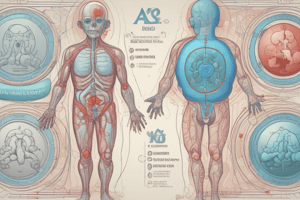Podcast
Questions and Answers
What is a common cause of DKA?
What is a common cause of DKA?
- Illicit drug use
- New onset diabetes
- Noncompliance with insulin therapy (correct)
- Elevated HbgA1C
Which of the following is a risk factor for HHS?
Which of the following is a risk factor for HHS?
- Age 13 to 25
- Female
- Morbid obesity (correct)
- Previous episodes of DKA
What is a common physical stress that can lead to DKA?
What is a common physical stress that can lead to DKA?
- Illicit drug use
- Surgery (correct)
- Infection
- Excessive alcohol use
Which of the following medications can increase the risk of DKA?
Which of the following medications can increase the risk of DKA?
Which demographic group is at a higher risk for HHS?
Which demographic group is at a higher risk for HHS?
What is a common complication of DKA and HHS?
What is a common complication of DKA and HHS?
Which of the following is a characteristic of HHS?
Which of the following is a characteristic of HHS?
What is a common electrolyte disturbance in DKA and HHS?
What is a common electrolyte disturbance in DKA and HHS?
Which of the following can be a fatal complication of DKA and HHS?
Which of the following can be a fatal complication of DKA and HHS?
What is a characteristic of Kussmaul respirations in DKA?
What is a characteristic of Kussmaul respirations in DKA?
Flashcards are hidden until you start studying
Study Notes
Causes of Diabetic Ketoacidosis (DKA) and Hyperosmolar Hyperglycemic State (HHS)
- Physical stress on the body can lead to DKA and HHS
- Underlying causes of DKA and HHS include:
- Injury
- Illness
- Infection
- Surgery
- Excessive alcohol use
- New onset diabetes
- Elevated HbA1C
- Illicit drug use
- Noncompliance with insulin therapy
- Certain medications can trigger DKA and HHS, including:
- Corticosteroids
- Antipsychotics
- Antidepressants
Risk Factors for DKA
- Age: 13-25 years old
- Female gender
- History of previous DKA episodes
Risk Factors for HHS
- Age: older than 65 years old
- Racial and ethnic groups at higher risk:
- African Americans
- Native Americans
- Hispanics
- Morbid obesity
Diabetic Ketoacidosis (DKA)
- Characterized by metabolic acidosis
- Symptoms include muscle weakness and dehydration leading to decreased cardiac output
- Electrolyte imbalance and loss of electrolytes occur
- Cardiac complications include cardiac arrhythmias
Complications of DKA
- Decreased perfusion to the kidneys
- Kussmaul respirations (abnormal breathing pattern)
Hyperosmolar Hyperglycemic Syndrome (HHS)
- Profound neurological manifestations occur
- Severe dehydration and muscle weakness
- High risk of thromboembolic disease (blood clots)
- Decreased perfusion to the kidneys and electrolyte loss
- Cardiac arrhythmias can occur
Studying That Suits You
Use AI to generate personalized quizzes and flashcards to suit your learning preferences.





